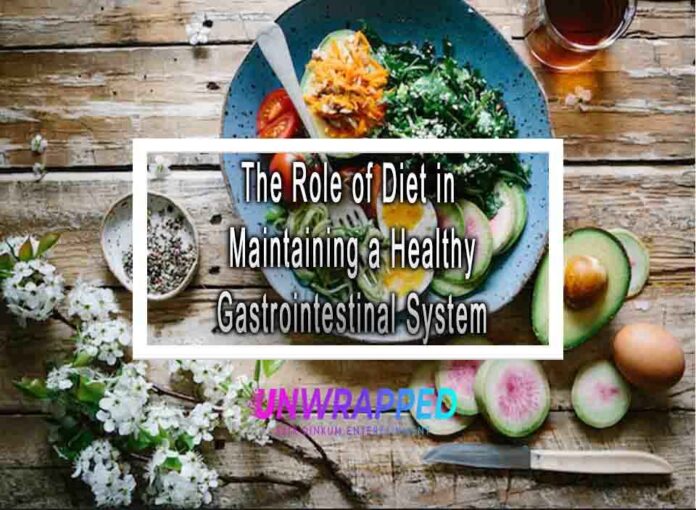Diet plays a crucial role in maintaining a healthy gastrointestinal (GI) system. A balanced and nutritious diet can promote proper digestion, protect the gut lining, support the growth of beneficial gut bacteria, and reduce the risk of GI disorders. Here’s an explanation of the role of diet in GI health:
1. Digestion and Nutrient Absorption:
- A well-rounded diet provides the necessary nutrients, including carbohydrates, proteins, fats, vitamins, and minerals, which are essential for overall health.
- Adequate fiber intake from fruits, vegetables, and whole grains supports regular bowel movements and prevents constipation.

2. Gut Microbiome Health:
- The gut microbiome consists of trillions of microorganisms, including beneficial bacteria, which play a critical role in GI health.
- Consuming a diverse range of fiber-rich foods, such as fruits, vegetables, legumes, and whole grains, nourishes beneficial gut bacteria, promoting a balanced and healthy microbiome.
3. Gut Barrier Function:
- Certain foods, like bone broth, collagen, and gelatin, contain amino acids that support the integrity of the gut lining.
- A healthy gut lining is crucial for preventing the entry of harmful pathogens and toxins into the bloodstream.
4. Reduction of Inflammation:
- Some foods, such as fatty fish (rich in omega-3 fatty acids), nuts, seeds, and berries (high in antioxidants), possess anti-inflammatory properties.
- Reducing chronic inflammation in the GI tract is essential for preventing various GI disorders and maintaining overall health.
5. Probiotics and Prebiotics:
- Probiotic-rich foods, like yogurt, kefir, sauerkraut, and kimchi, contain beneficial bacteria that support gut health.
- Prebiotic foods, including garlic, onions, asparagus, and oats, provide nourishment for these beneficial gut bacteria.
6. Hydration:
- Adequate water intake is essential for GI health. It helps soften stool and supports the passage of food through the digestive tract.
- Dehydration can lead to constipation and other digestive problems.
7. Avoidance of Irritants:
- Certain substances, like caffeine, alcohol, spicy foods, and artificial sweeteners, can irritate the GI tract and trigger digestive discomfort.
- Avoiding or moderating these substances may help maintain a healthy GI system.
8. Dietary Fiber and Bowel Regularity:
- Consuming foods rich in soluble and insoluble fiber, such as bran, beans, and whole grains, can promote regular bowel movements and prevent conditions like constipation and diverticulosis.
9. Balanced Meals and Portion Control:
- Eating balanced meals with a mix of macronutrients (carbohydrates, protein, and fats) and portion control can help prevent overeating and support healthy digestion.
10. Specific Diets for GI Disorders:
- Some GI disorders, such as irritable bowel syndrome (IBS) or inflammatory bowel disease (IBD), may benefit from specific dietary modifications. For example, low-FODMAP diets for IBS or anti-inflammatory diets for IBD.
In summary, a well-planned and balanced diet is essential for maintaining a healthy gastrointestinal system. It supports proper digestion, provides nutrients for the gut microbiome, prevents inflammation, and reduces the risk of GI disorders. A diet rich in fiber, probiotics, and a variety of nutrient-dense foods is key to promoting optimal GI health. If you have specific GI concerns or conditions, consult with a healthcare professional or registered dietitian for personalized dietary recommendations.












